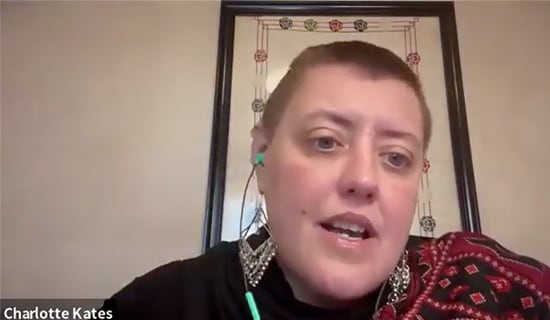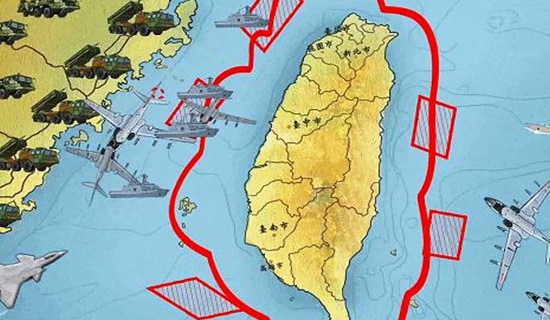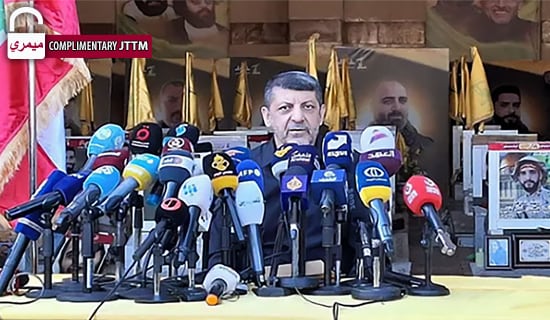August 26 of this year marks the 18th anniversary of Pakistan's assassination of Nawab Akbar Bugti – who was neither a terrorist, nor a jihadi commander, nor a secessionist rebel, but a former defense minister of Pakistan, a former chief minister of the country's largest province of Baluchistan elected by its people, a former governor of the province who stood for democratic constitutional principles, and the chief of the Bugti tribe who was respected across Pakistan and beyond. Islamist groups and students who ravaged the campuses of U.S. universities this year do not stand for Bugti and his people in Baluchistan, where the Pakistani army is even today carrying out genocidal murders of Baluchis.
On the orders of General Pervez Musharraf, then the president and army chief, the Pakistan military killed Nawab Akbar Bugti (July 12, 1926 – August 26, 2006) along with "140 people from the Bugti and Marri tribes" in an air and ground operation in the Bhamboor Hills in Baluchistan.[1] An anti-terrorism court in Baluchistan issued arrest warrants for General Musharraf, former Prime Minister Shaukat Aziz, former Baluchistan chief minister Jam Mir Mohammad Yusuf, and Awais Ahmed Ghani, a former governor of the province.[2] In 2015, Gen. Musharraf even "begged" for a pardon for Bugti's assassination under Pakistan's qisas and diyat ("retribution and compensation") law, according to Nawabzada Jamil Bugti, son of Nawab Akbar Bugti.[3]
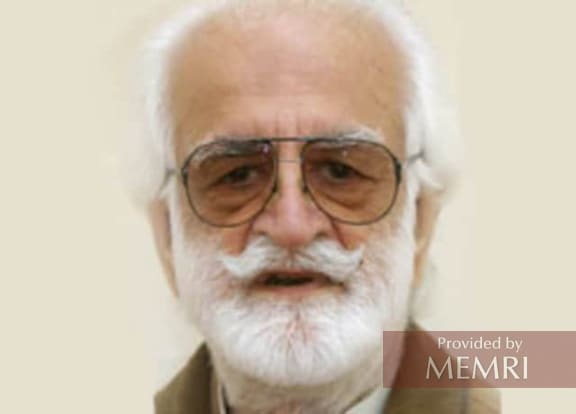
Nawab Akbar Bugti was a tribal chief and political leader respected across Pakistan.
On September 1, 2006, just days after Bugti's assassination, speakers at a seminar in Islamabad agreed he was "killed for seeking provincial rights" – a continuing demand for autonomy for a province where government jobs and natural resources benefit outsiders from the politically influential Punjab province and nowadays the Chinese businessmen, rather than the local Baluchis.[4] Speaking at the seminar, Bushra Gauhar of Awami National Party said: "Bugti was killed because he raised voice for the rights of his province. Instead of holding talks with him, the army threw missiles at him."[5]
Pakistan has executed military operations in different parts of Baluchistan in 1948-52, 1958-60, 1962-69, 1973-77, and from 2004 onward. In fact, the Pakistani army's control of the province is so air-tight that during the 2001-2021 war against the U.S. and NATO troops in Afghanistan, Pakistan decided to house and shelter the top Afghan Taliban leaders in Quetta, the capital of Baluchistan, giving birth to the Quetta Shura, the regional executive council from where the jihadi commanders executed the anti-U.S. jihad, forcing the American military exit in 2021.[6] The highly militarized province of Baluchistan was the secure base for Pakistan to lead and execute the anti-American jihad in Afghanistan and with U.S. money, having received $14.5 billion in military aid and $18.8 billion in economic assistance from the U.S. since 9/11 to 2017.[7]
In the pyramid of power, the government of Pakistan is run by the prime minister while the president is the symbolic head of state, but the army chief is the real unquestioned king and so his forces are above the law. Over the past few decades, Baluchi youths, student activists, conscientious academics, rebels fighting for independence of Baluchistan, and others have been regularly abducted by Pakistani army and intelligence agents. These people are known as "missing persons" with their bodies being found by roadsides or gone missing.
By 2024, the Commission of Inquiry on Enforced Disappearances, a body constituted by the Pakistani government under popular pressure, registered 10,200 cases of missing persons, mostly from Baluchistan but also from Khyber Pakhtunkhwa and Sindh, though the unofficial number is far more.[8] In 2015, nearly a decade ago, human rights advocate Mir Mohammad Ali Talpur had put the number of missing Baluchis at 18,000 and of the tortured bodies found in Baluchistan as well as in Karachi at 800.[9] Islamic religious scholars who frequently turn out in the streets of Pakistan in support of Palestine seal their lips over the issue of missing persons.
On July 30, 2024, the Islamabad High Court (IHC) resumed hearing the case involving "all the missing persons, including doctors, engineers, IT experts and journalists, and Baluchi students."[10] Justice Mohsin Akhtar Kayani, who was part of a three-member IHC bench, expressed exasperation that despite the attorney general's affidavit, "enforced disappearances are still continuing."[11] On August 4, 2024, Justice Miangul Hassan Aurangzeb of the IHC, in a case involving the disappearance of a politician's brother, wrote in an order: "The ultimate responsibility is on the shoulders of the personages at the helm of affairs in the government, which under our Constitution are the prime minister and the (federal) cabinet."[12] His ink dried in constitutionalism; the Baluchis go missing in the extrajudicialism of the Pakistan army.
Unable to prosecute the cases of missing persons, courts in Pakistan and human rights groups are exasperated because the perpetrators belong to the Pakistani army and intelligence agencies operating in Baluchistan. In 2012, the then Chief Justice of the Supreme Court of Pakistan, Justice Iftikhar Mohammad Chaudhry, asked the intelligence agencies to abolish their "death squads" in Baluchistan, noting that the court "issued 60 orders during the 68 hearings on the case but no practical steps were taken."[13] The chief justice warned at the time that "the missing persons would be recovered and that the court would go to any extent, if needed, to achieve the purpose" and "all overt and covert operations must be put to an end and the displaced Baluchis should be rehabilitated."[14] But the death squads report to the army chief, not to the state.
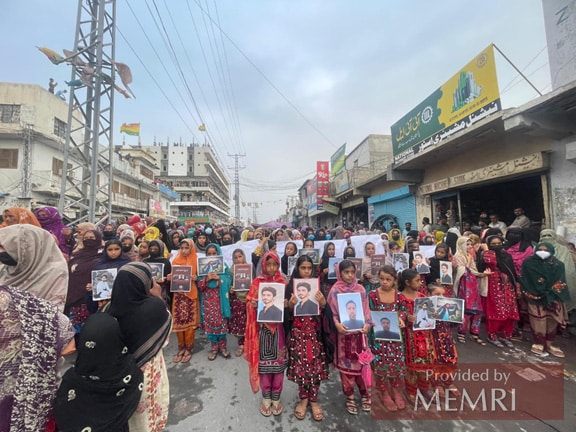
Relatives of missing persons in Baluchistan demand to know the whereabouts of their relatives
The State of Human Rights in 2023, which is published by the Human Rights Commission of Pakistan (HRCP), stated: "As in previous years, the practice of enforced disappearances and extrajudicial killings remained a particularly serious concern in the province of Baluchistan, with impunity for the perpetrators and indifference on the part of the government."[15]
It added: "While dozens of new cases were reported throughout Baluchistan, there were some instances in which victims returned home... As in previous years, Baluchi activists continued to demand an end to enforced disappearances and accountability for those involved in this practice..."[16] The HCRP report narrated a number of cases of enforced disappearances of Baluchis, including its own member Salim Baloch from the town of Turbat.[17]
According to documents submitted before the 56th Session of the UN Human Rights Council (UNHRC), on February 26-April 5, 2024, the Commission of Inquiry on Enforced Disappearance (COIED), which the Pakistani government established in March 2011 with a mandate to trace the whereabouts of enforced disappeared persons, "failed to hold even a single perpetrator of enforced disappearance responsible in its 12 years of existence."[18] Under the military's pressure, courts in Pakistan have routinely absolved military officials, including General Pervez Musharraf, now in the other side of life, of any charges.
The UNHRC document noted: "The seriousness of Pakistan to resolve this issue can be gauged from the fact that even the Bill on Missing Persons (though controversial and lacked international standards) presented by former Minister for Human Rights Dr. Shireen Mazari went missing when sent to the Office of Chairman Of The Senate of Pakistan. Just like the Missing Persons, even the Bill was disappeared by the military secret services of Pakistan. Missing for over two years, the Bill has to be still recovered."[19] According to a report, Shireen Mazari stated: "We had prepared the bill regarding missing persons, and it was passed by... the National Assembly. But it went missing after it was sent to the Senate."[20] A subsequent version of the Bill passed by the parliament also failed to get the president's signature.
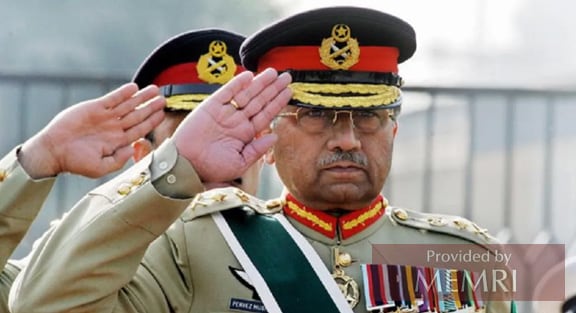
Though General Pervez Musharraf, who ordered the assassination of Nawab Akbar Bugti, died in exile and in disgrace, his body was brought and buried in Pakistan.
The families of the missing persons are at sea, helpless and finding no emotional closure, unable to know whether their missing relatives are dead or alive. Toward the end of 2023, mothers, sisters, and wives of the missing persons – organized under the banner of Baloch Yakjehti Committee and Voice for Baloch Missing Persons – began a popular march, though not the first of its kind, against the extrajudicial disappearances and killings. Their movement began from Turbat through Quetta and to Islamabad, where they still nurture an imperiled nation's hope for loved ones to return.
Dr. Mahrang Baloch, the central organizer of the Baloch Yakjehti Committee (BYC), in statements on Facebook, noted that Pakistani security agencies are continuing to abduct and harass the relatives of missing persons. In July, several female BYC members were unlawfully arrested in Khuzdar; the brother of a female activist was abducted and threatened to force her "not to participate" in any protest in Gwadar; activists were harassed in Hub Chowki and police cases were registered against 11 members of BYC; in Turbat, security forces confiscated telephones; BYC members received threatening calls and were summoned to military camps in Kohlu; Baluchi activists in Kalat were forced by security forces not to mobilize people; in Quetta, activists were detained and questioned; several BYC members in Karachi were arrested.[21]
Dr. Mahrang Baloch, writing on Facebook, reflected on the tragedy facing her people: "As a Baloch nation today, we are going through a contradiction. We are faced with a dangerous genocide due to our weak status and on our own soil are experiencing extreme humiliation."[22] She also turned down suggestions for monetary compensation to the victims of state torture, saying: "The blood of our martyrs is not so cheap that we accept compensation for the blood of our martyrs. And we will not disrespect our Baloch nationalist martyrs..."[23]
Following are images of the women-led protesters holding photos of their relatives abducted by Pakistani security forces at protests in various towns of Baluchistan demanding to know the whereabouts of their loved ones (all images: Facebook.com/BalochYakjehtiCommitee)
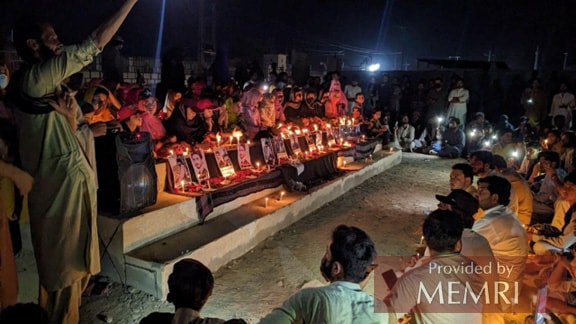
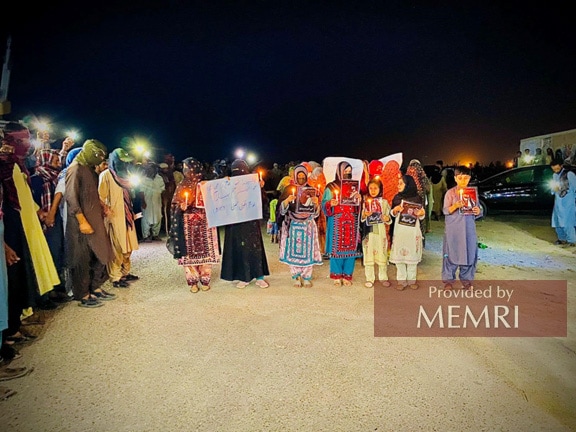
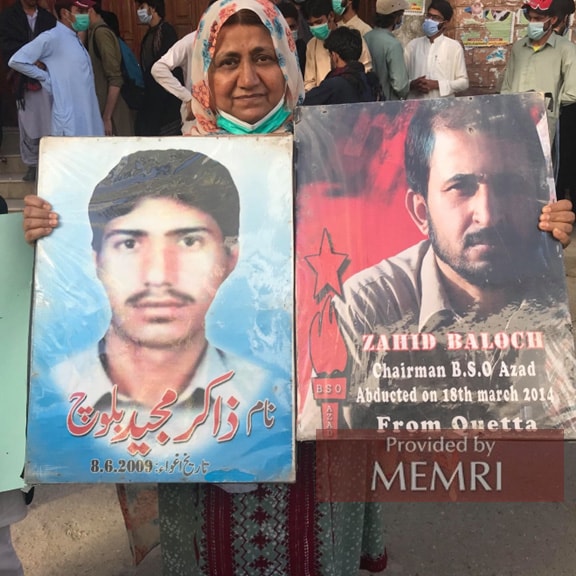
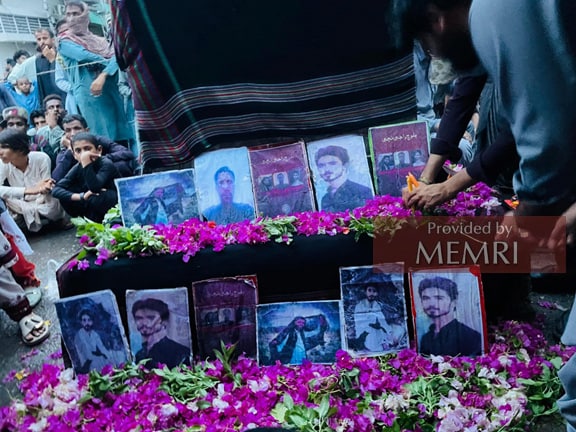
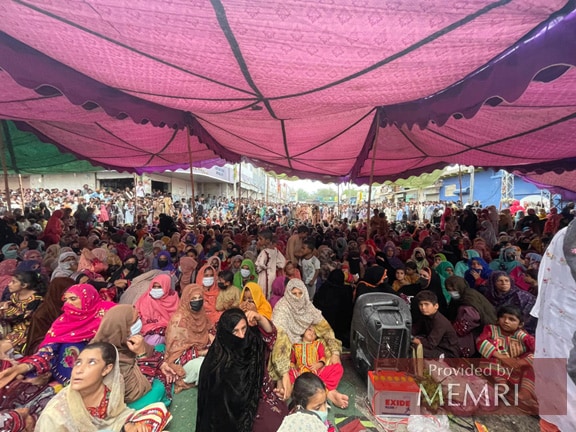
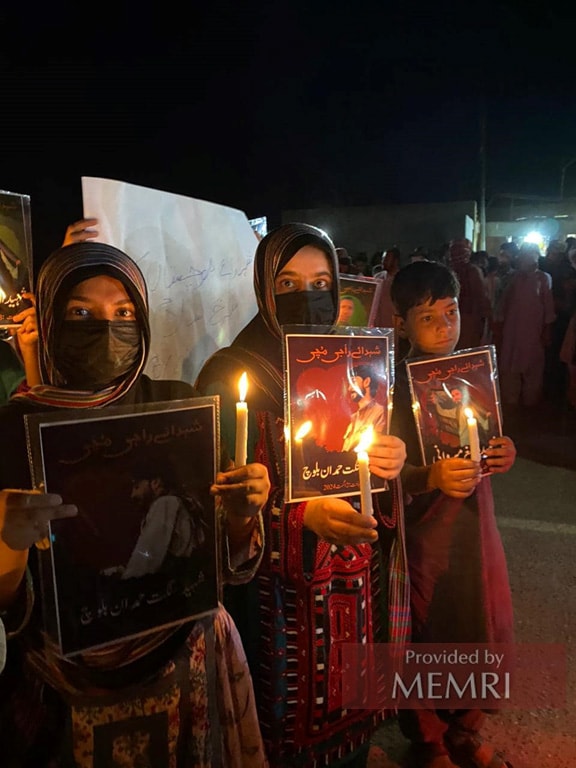
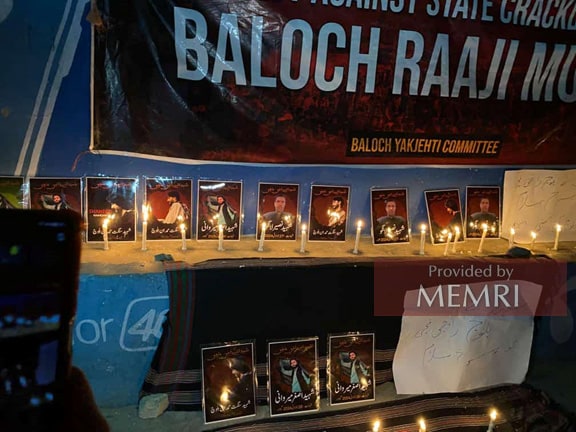
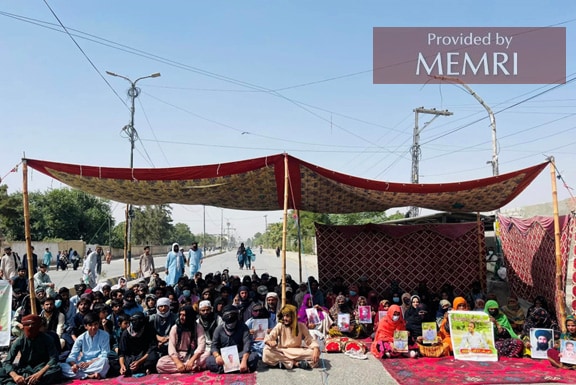
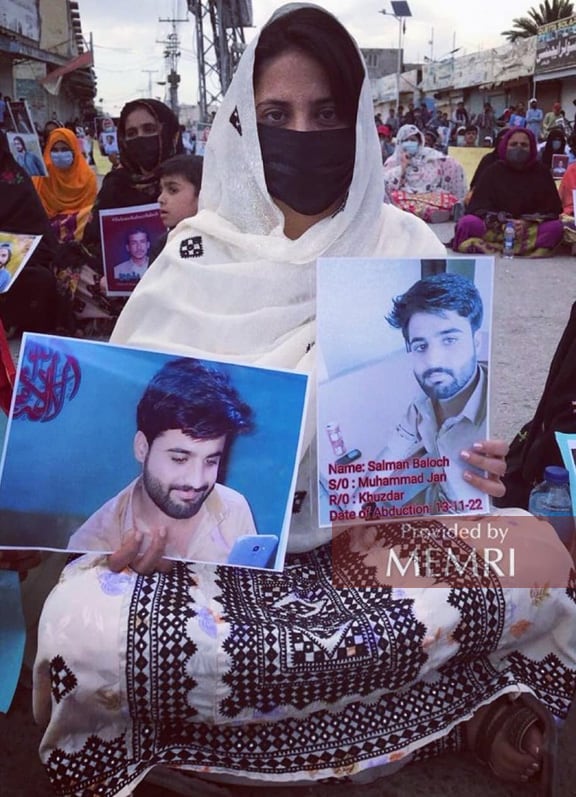
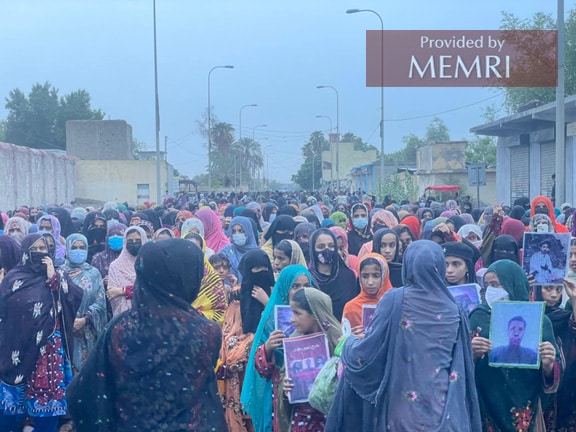
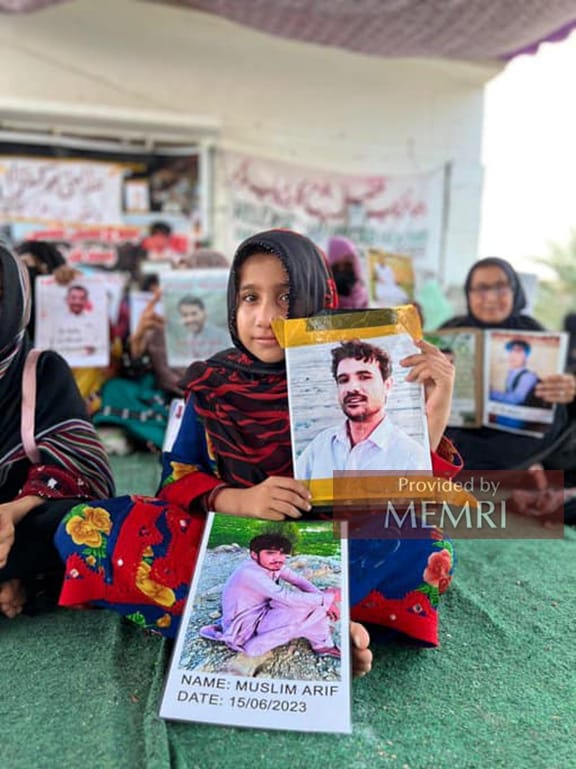
* Tufail Ahmad is Senior Fellow for the MEMRI Islamism and Counter-Radicalization Initiative.
[1] Dawn.com (Pakistan), August 27, 2006. The spellings and names of persons and places in this dispatch have been changed for clarity and standardization.
[2] Tribune.com.pk (Pakistan), August 16, 2012.
[3] Dawn.com (Pakistan), December 30, 2015.
[4] Dawn.com (Pakistan), September 2, 2006.
[5] Dawn.com (Pakistan), September 2, 2006.
[6] Quetta Shura: Revival of Taliban in Afghanistan, Pakistan Journal of International Affairs, Vol. 5, Issue 2 (2022).
[7] VOAnews.com (U.S.), January 4, 2018.
[8] Thenews.com.pk (Pakistan), August 4, 2024.
[9] MEMRI Special Dispatches Series No. 5698, MEMRI South Asia Studies Project Director Tufail Ahmad In Column: Pakistani Army Is Carrying Out Genocidal Murders In Balochistan – Like It Did Against Bengalis Four Decades Ago, March 28, 2014.
[10] Thenews.com.pk (Pakistan), July 31, 2024.
[11] Thenews.com.pk (Pakistan), July 31, 2024.
[12] Thenews.com.pk (Pakistan), August 4, 2024.
[13] Dawn.com (Pakistan), September 27, 2012.
[14] Dawn.com (Pakistan), September 27, 2012.
[15] HRCP-web.org (Pakistan), accessed August 4, 2024.
[16] HRCP-web.org (Pakistan), accessed August 4, 2024.
[17] HRCP-web.org (Pakistan), accessed August 4, 2024.
[18] Documents.UN.org, accessed August 4, 2024.
[19] Documents.UN.org, accessed August 4, 2024.
[20] Voicepk.net (Pakistan), January 9, 2024.
[21] Facebook.com/dr.mahrangbaloch01, accessed August 3, 2024.
[22] Facebook.com/dr.mahrangbaloch01, accessed August 3, 2024.
[23] Facebook.com/dr.mahrangbaloch01, accessed August 3, 2024.


